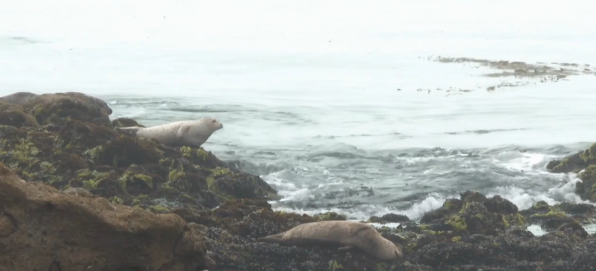Domoic acid poisoning has harmed some marine mammals along the coast

Domoic acid has been harming some marine mammals along the coast for three weeks.
Click here for updates on this story
SAN LUIS OBISPO COUNTY, California (KSBY) — If you visit some Central Coast beaches, you may see sea lions breached and wedged in between rocks or even just lying on the sand.
It’s been about three weeks since domoic acid has been harming some marine mammals along the coast.
One rescue organization says the numbers are already four times what they saw all of last year.
By the Cal Poly Pier in Avila Beach, Chris La Scola says he saw what he believes was a sick sea lion last week.
“I’ve fished all these rocks forever and it’s something I’ve never seen before,” La Scola said.
He saw the sea lion wedged in the rocks.
“It was definitely alive but shaking a little bit,” said La Scola. “Almost like it was convulsing a little bit.”
Domoic acid poisoning has sickened more than 100 sea lions and at least one dolphin in the past two and a half weeks, according to the Marine Mammal Center.
A large increase compared to the 25 domoic acid cases in the area last year, according to the Marine Mammal Center.
The organization’s coverage area starts near San Luis Obispo and extends 600 miles north.
“The feeling would be kind of helpless, ” said John Frady, a Shell Beach resident.
Frady often surfs in Shell Beach and says he has seen more than five sick sea lions over the last two weeks.
“Those seals will sometimes be there for days and days and you’ll see them dead one day after that,” Frady said.
According to NOAA Fisheries, marine mammals get poisoned by domoic acid when consuming contaminated fish, which can cause seizures, brain damage, and death.
“You wish they could help them out but no one can take care of them if you tried to rescue them,” Frady said.
Officials with the Marine Center say to keep a safe distance of at least 50 yards away from sea lions because of the unpredictability and overall stress levels to the mammal.
According to NOAA, the domoic does not appear harmful to fish or swimmers; it can be found in shellfish, mussels or oysters, and Dungeness crab.
As of right now, the Marine Mammal Center says it is unclear how long this will last as they are not seeing a noticeable decline at this time. If you see a mammal in need of assistance, reach out to 415-289-SEAL.
Please note: This content carries a strict local market embargo. If you share the same market as the contributor of this article, you may not use it on any platform.